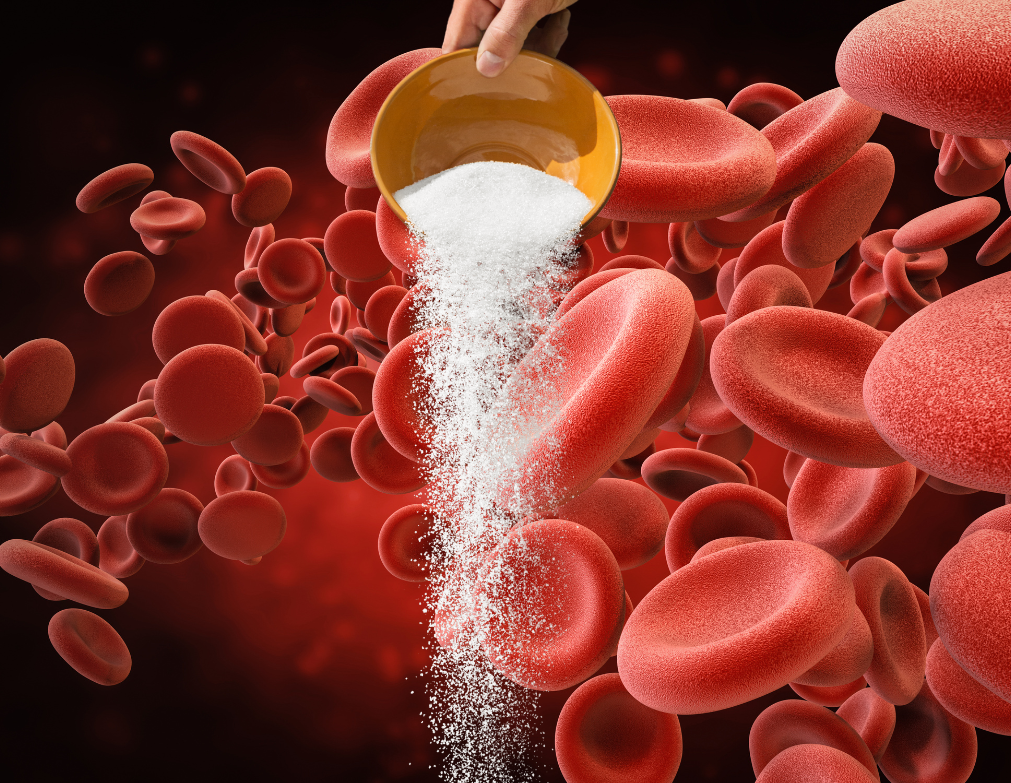
“Preventing blood sugar spikes involves lifestyle and dietary habits that promote stable blood sugar levels.“
- Liz Keller, MS, CNS, ASCM-PT

Prevent Weight Gain by Balancing Blood Sugar
What is Blood Sugar?
When you hear “blood sugar,” a few things might come to mind: diabetes, sweets, insulin, and maybe glycemic index. If “sweets” are the only thing that comes to your mind, don’t worry; you are not alone. Blood sugar, or rather blood glucose, refers to the concentration of glucose (a form of sugar) in your bloodstream at a given moment of the day. Glucose is a crucial source of energy for our bodies. As we eat throughout the day, it is normal for our blood glucose number to fluctuate.
Why do Blood Sugar Spikes make you Gain Weight?
Blood sugar spikes can contribute to weight gain in several ways. Here’s an overview of how this process works:
· Insulin Response: Your blood sugar levels rise when you consume food, especially those high in carbohydrates. In response, the pancreas releases insulin to help cells absorb and use glucose for energy.
· Increased Fat Storage: Insulin facilitates glucose uptake by cells and promotes the storage of excess glucose as fat, primarily in adipose (fat) tissue. This is even more of a concern when blood sugar spikes are frequent (having “cheat days” instead of “cheat meals”), leading to a sustained rise in insulin levels.
· Prevention of Fat Breakdown: Elevated insulin levels inhibit the breakdown of stored fat (lipolysis). This means that even in a calorie deficit, your body is less efficient at utilizing fat stores for energy when insulin levels are high.
· Increased Appetite: Blood sugar spikes, followed by significant drops in your blood sugar, can trigger an increase in appetite. This can lead to overeating, making consuming more calories than the body needs easier and contributing to weight gain over time.
· Insulin Resistance: Chronic exposure to high blood sugar levels and elevated insulin levels can lead to insulin resistance. In insulin resistance, cells become less responsive to the effects of insulin, requiring higher insulin levels to achieve the same effect. This condition is associated with weight gain and obesity.
· Increased Belly Fat: Some studies suggest that sustained high blood sugar levels, especially in the presence of insulin resistance, may lead to preferential fat storage in the abdominal region. This fat distribution (visceral fat) is linked to an increased risk of obesity-related health issues.
· Hormonal Imbalances: Blood sugar spikes can disrupt hormonal balance, affecting hormones in appetite regulation and metabolism. This imbalance can contribute to increased fat storage and weight gain
Ways to Manage Your Blood Sugar
Preventing blood sugar spikes involves lifestyle and dietary habits that promote stable blood sugar levels. Here are some tips for the holidays and year-round!
Start your day with a savory breakfast:
A sweet breakfast is a sure way to lead to a roller coaster of blood sugar spikes throughout the day. Try focusing on protein from eggs and whole grains to start your day off stable.
Start every meal with vegetables for fiber:
Fiber helps slow down the absorption of sugar, preventing rapid spikes. Choose high-fiber foods such as fruits, vegetables, whole grains, and beans. Try eating a salad or vegetables before consuming a high-carbohydrate meal.
Pair Carbohydrates with Protein and Healthy Fats:
Combining carbohydrates with protein and healthy fats can further slow down the absorption of sugar. For example, having eggs with toast is better for blood sugar than having toast alone.
Control Portion Sizes:
Be mindful of portion sizes to avoid overloading your system with a large amount of carbohydrates at once. Eating smaller, balanced meals throughout the day can help maintain more stable blood sugar levels.
Limit Added Sugars:
Minimize your intake of sugary foods and beverages, as they can cause rapid spikes in blood sugar. Check food labels for hidden sugars.
Stay Hydrated:
Drinking water helps regulate blood sugar levels. Dehydration can lead to higher blood sugar concentrations, so aim to stay well-hydrated throughout the day.
Regular Physical Activity:
Exercise helps improve insulin sensitivity and can lower blood sugar levels. Include both aerobic exercises and strength training in your routine. Weight lifting, or resistance training, has been shown to improve insulin sensitivity and increase glucose uptake into muscle cells.
Manage Stress:
Chronic stress can contribute to blood sugar spikes. Practice stress-reducing activities such as deep breathing, meditation, yoga, or other relaxation techniques.
This Holiday Season:
Drink Apple Cider Vinegar before meals! There is some evidence to suggest that vinegar may have a beneficial effect on blood sugar levels. Here are a few ways in which vinegar may impact blood sugar:
– Improved Insulin Sensitivity: Some studies suggest that vinegar may improve insulin sensitivity, meaning the body’s cells become more responsive to insulin. This can help the cells take up glucose more effectively, reducing the risk of elevated blood sugar levels.
– Slower Absorption of Sugars: Vinegar has been shown to slow down the rate at which food leaves the stomach and enters the lower digestive tract. This delayed gastric emptying may lead to a slower and more gradual increase in blood sugar levels after a meal.
– Reduced Post-Meal Blood Sugar Spikes: Several studies have indicated that consuming vinegar with a meal, especially one high in carbohydrates, can lower post-meal blood sugar levels than meals without vinegar.
Apple Cider Vinegar Drink Recipe
● 16 ounces hot water
● 2 tablespoons apple cider vinegar
● 2 tablespoons lemon or lime juice
● ½ to 1 teaspoon ground ginger
● ¼ teaspoon cinnamon
● A dash of cayenne pepper
Key Takeaways
To prevent excessive weight gain during this holiday season, it is important to first watch your portion sizes. Try adding fiber and pairing carbohydrate meals with other macronutrients. Drink water, exercise, and take time to destress to prevent blood sugar spikes not caused by food. And lastly, try adding apple cider vinegar into your routine to help combat the seasonal treats you know will inevitably be part of your diet this time of year!
To work with me on lifestyle habits and diet changes, schedule a free 20-minute consult using this link: fi.holisticnutritiontherapy.com/
Looking to Make a Better Choice?
Well Choices at Fitness Incentive
Visit fi.holisticnutritiontherapy.com to schedule a free 20-minute phone consultation with Liz to go over any questions you may have and start working towards formulating a plan to achieve your optimal health and wellness potential!
For a personalized approach to your diet, send me an email at liz.k@well-choices.com or text to (240) 803-3438
Sponsored Links
About the Author

Liz Keller
Liz Keller, MS, CNS, ACSM-PT is a nutritionist, personal trainer, group fitness instructor, and health coach. She runs the Well Choices program at Fitness Incentive.










